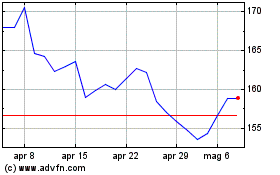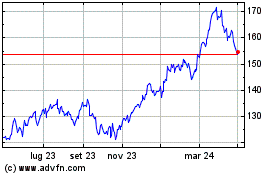By Robert Wall
This article is being republished as part of our daily
reproduction of WSJ.com articles that also appeared in the U.S.
print edition of The Wall Street Journal (February 16, 2018).
TOULOUSE, France -- Airbus SE and Boeing Co. are cashing in on
unprecedented demand by airlines for new planes, driven by record
numbers of passengers taking to the sky.
Airbus shares surged more than 10% Thursday after reporting
higher cash flow driven by record jet output for last year. It
promised to boost plane deliveries even more this year to fill the
orders from airlines and aircraft leasing companies. Last month,
Boeing reported its own strong year of profit and sales growth, and
forecast an even better 2018 after a record number of deliveries
last year.
Passenger growth has surpassed industry expectations for several
years. Last year, passenger growth hit 7.5%, beating the 5.9%
forecast by the International Air Transport Association, an
industry body.
Today's largely synchronized global economic growth is lifting
passenger numbers. But the falling cost of air travel, in part
thanks to an increase in budget airlines around the world, is also
contributing. The surge represents the " most rapid expansion at a
global level that we've ever seen," said John Plueger, chief
executive of plane leasing firm Air Lease Corp., in a recent
interview.
Traffic growth has historically averaged around 5%, but now
looks set to average 6% in coming years, according to a recent note
by Bernstein Research.
Coinciding with all that new demand, airlines have benefited
from several years of relatively low fuel prices due to cheaper
oil, boosting returns and giving them the financial flexibility to
refresh their fleets. Overall industry profits for 2018 are
projected to rise around 11% over last year, IATA forecasts.
Boeing, the world's biggest plane maker, and No. 2 Airbus have
order backlogs that stretch out for years. That has forced both
companies to revamp supply chains and manufacturing processes to
cope. Both have fumbled in the recent past with shortages of
components like seats, toilets and even engines. But they have
largely met delivery targets and have succeeded, so far, in turning
their big order books into cash.
Airbus delivered a record 718 planes in 2017. The company said
Thursday it took in EUR2.95 billion ($3.68 billion) in free cash
flow, excluding items like acquisitions, divestitures and customer
financing. It had targeted about EUR1.4 billion, on par with the
year-earlier period. Airbus also said it plans to increase its
dividend by 11%.
Looking ahead, Airbus forecast adjusted earnings this year to
increase 20% and said cash generation should be similar to
2017.
To meet future demand, Airbus said it is raising output to
around 800 airliners this year. Boeing last month said it planned
to lift production to between 810 and 815 planes this year, up from
763 last year.
Airbus had already announced plans to boost output of its
single-aisle planes to 60 a month next year from around 50 in 2017.
Chief Executive Tom Enders said Thursday that demand could possibly
support more than 70 planes a month.
Boosting production hasn't been without its challenges,
especially for Airbus. The company has been struggling with the
supply of engines on its popular A320neo plane, slowing deliveries.
Last week, Airbus said problems with one of the engines, made by
United Technologies unit Pratt & Whitney, were delaying planes,
and on Thursday it warned engine problems could jeopardize plane
delivery goals for this year. Delivery of Pratt-powered A320neo
planes won't resume until the supplier has a fix ready, which
Airbus expects in April.
Rival engine supplier CFM International, a joint venture between
General Electric Co. and France's Safran SA, also has been behind
schedule on delivering equipment.
Mr. Enders said suppliers' ability to support Airbus's increased
output would largely dictate whether the company this year decides
to raise output of some plane models beyond current
commitments.
Airbus said yearly net profit rose sharply to EUR2.87 billion,
compared with EUR995 million in 2016, when earnings were hurt by
foreign exchange effects and plane program charges. Airbus's
operating earnings, which strip out some one-time items, were
EUR4.25 billion, compared with EUR3.96 billion a year earlier.
The Toulouse-based company reported EUR66.8 billion in sales,
little changed from a year earlier. Higher revenue from commercial
airliners was offset by weakness in the helicopter business and
defense and space. Airbus said it took a EUR1.3 billion charge on
its long-troubled A400M military transport program. That raised to
more than EUR8 billion the combined charges the company has taken
on the plane, which has been beset by delays and technical
problems.
Airbus is also wrestling with other issues. The company faces
regulatory probes in multiple jurisdictions, including a widening
review in the U.S. about the improper use of middlemen to win
contracts.
It is also in the middle of a shift in senior management, as Mr.
Enders won't seek an extension of his contract beyond April 2019,
leaving him just over a year to find a successor. And Chief
Operating Officer Fabrice Brégier, who runs the commercial plane
division that delivers most of Airbus's revenue and profit, leaves
this month.
Write to Robert Wall at robert.wall@wsj.com
(END) Dow Jones Newswires
February 16, 2018 02:47 ET (07:47 GMT)
Copyright (c) 2018 Dow Jones & Company, Inc.
Grafico Azioni Airbus (EU:AIR)
Storico
Da Mar 2024 a Apr 2024

Grafico Azioni Airbus (EU:AIR)
Storico
Da Apr 2023 a Apr 2024
